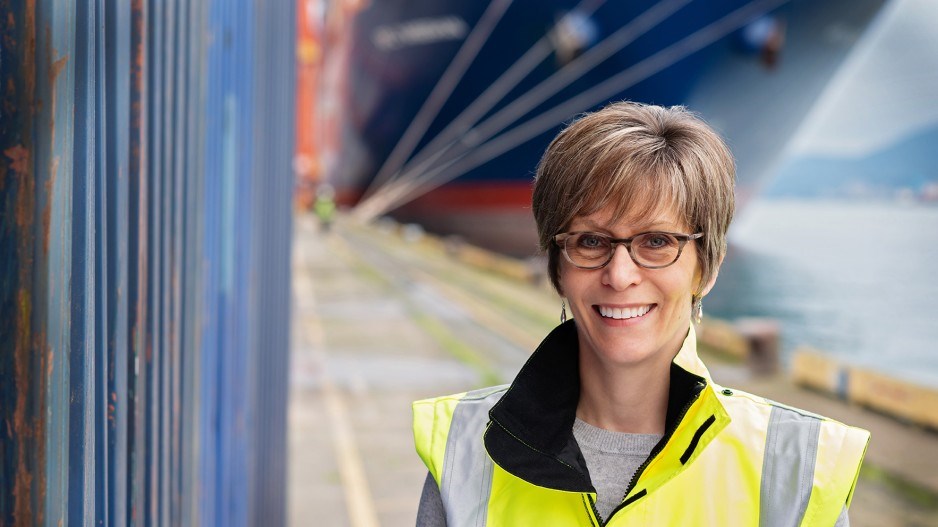What does a senior executive look like? Ask Cheryl Yaremko’s three sons, and they’ll probably tell you she looks like their mom. “For most of their memories, I’ve been in a senior role,” she says. “So that’s just normal for them. It’s what moms do.”
Yaremko, chief financial officer for Global Container Terminals (GCT), wants to ensure more women are viewed in the same way.
“Almost my entire career has been spent in male-dominated industries,” Yaremko says. “I know what it feels like to be the only woman at the table. That’s why I’m committed to making a difference for women, minorities and others who may feel left out of the labour market.”
Vancouver-based GCT operates four Green Marine-certified terminals in two North American ports, including GCT Deltaport and GCT Vanterm in the Lower Mainland. GCT Canada is the largest maritime employer in the Port of Vancouver. When Yaremko joined the company in 2018, she was already a respected expert with extensive experience in finance, accounting, pension planning, enterprise risk management, supply chain, IT and administration.
A chartered professional accountant, Yaremko has held various senior leadership roles in male-dominated workplaces. She was CFO at BC Hydro and BC Railway Company. Before that, she was the corporate controller at Western Star Trucks and a manager at Ernst & Young.
Throughout her career, Yaremko has grown accustomed to being the only woman, or one of very few, at senior executive meetings. However, it’s never been an impediment, she says. Raised to treat people the way she would like to be treated, she led with integrity and a bold sense of purpose to earn respect and a seat at the table.
“I knew I deserved to be there and never felt I didn’t belong or was out of place,” she explains. Still, she continues, the role of allies has been critical. “Every step forward for me was provided to me by a man. I was lucky to work with men who saw potential in women and weren’t afraid to promote me.”
That’s not to say Yaremko is unaware of the challenges women face in terms of missed work opportunities and promotions. “After all, it is often men who still have the power to make these decisions and choose who is on executive teams,” she says.
It’s why Yaremko created a women’s leadership group at GCT to encourage mentorship and allyship, discuss priority issues and work with members of the group to develop strategies for recruiting more women to all levels of employment, including senior management roles.
She understands allies are key and often takes recommendations from the group to her male colleagues. “Before, it seemed like a woman’s issue to solve. Now we know everyone needs to play a role,” she describes.
Yaremko also feels strongly about GCT taking an active role in the Waterfront Diversity, Equity and Inclusion (DEI) Council. The council, which includes representatives from more than 10 of the largest terminal employers and operators in British Columbia, has a mandate to transform the province’s waterfront workforce and leadership by fostering diversity, equity, and inclusion.
Its members conduct regular audits toward more inclusive workplaces, focusing on key priorities, including allyship awareness and education, which identifies discrimination and bias in the workplace while advocating for social groups that may be subjected to unfair practices. This includes women, Indigenous peoples, and those with different abilities.
Like many waterfront companies, GCT is keen on improving representation among dock forepersons. “We recently hired three female forepersons,” says Yaremko. “Now, other women can see it’s an option.”
Eric Waltz, President of GCT Canada, and a champion of the Waterfront DEI Council, says Yaremko is helping to create a workplace that is clear about where the gaps are in terms of inclusion of under-represented groups and clear about how to close those gaps.
“Cheryl’s the kind of leader who can solve complex issues by aligning differing views, and that’s key when it comes to a diverse workplace where people can express their unique perspectives,” he says.
When it comes to DEI, Yaremko believes everyone has a role to play in making our workplaces more representative of society.
“We’re committed to building a workforce that mirrors the community,” she says. “Not only is it the right thing to do, but it creates a more resilient, effective organization.”




